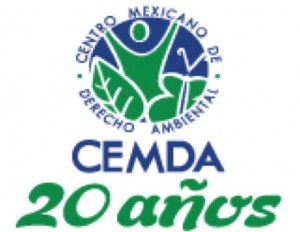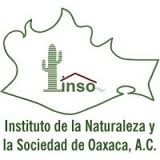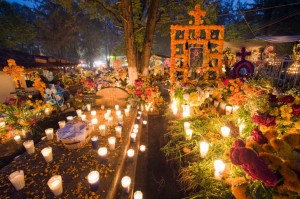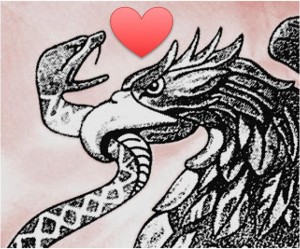Mexico is one of the most bio- and culturally diverse countries on the planet – its future depends very much on the people that lead it. My internship time was split four months in Mexico City and one month in Oaxaca City, working with CEMDA and INSO, respectively. The experience in each city helped me unravel more of the complex socioeconomic and environmental problems facing Mexico, and it also gave me some insight on how they could be solved. In short, a balance between nature and society needs to be found making environmental NGOs, like CEMDA and INSO, extremely important. But it is not without the love of the human dimension that this will be possible.
 CEMDA focuses on policy-making in areas such as air quality, sustainable infrastructure, energy and climate change and the legal defense of human rights and the environment. INSO focuses on water issues affecting society, soil use and restoration, alternative technologies and sustainable agricultural production, and environmental education. CEMDA being a more government level NGO and INSO being grassroots, each group diffently taught me the value of human dimensions in environmental action. The weekly and bi-weekly meetings, formal and informal email exchange and the long and quick touch-and-go talks, all provided each group to opportunity to reconnect, realign, and remember why they were here for. Whether I was in the office or out in the field, I learned that the social cohesion between individuals in a group is almost independent of the physical setting. Finally, the value of the individual within a team, how each member’s individual accomplishments are crucial to the overall group’s success. Such qualities I saw that were fundamentally important for environmenal NGOs wanting to achieve game-changing policy influence.
CEMDA focuses on policy-making in areas such as air quality, sustainable infrastructure, energy and climate change and the legal defense of human rights and the environment. INSO focuses on water issues affecting society, soil use and restoration, alternative technologies and sustainable agricultural production, and environmental education. CEMDA being a more government level NGO and INSO being grassroots, each group diffently taught me the value of human dimensions in environmental action. The weekly and bi-weekly meetings, formal and informal email exchange and the long and quick touch-and-go talks, all provided each group to opportunity to reconnect, realign, and remember why they were here for. Whether I was in the office or out in the field, I learned that the social cohesion between individuals in a group is almost independent of the physical setting. Finally, the value of the individual within a team, how each member’s individual accomplishments are crucial to the overall group’s success. Such qualities I saw that were fundamentally important for environmenal NGOs wanting to achieve game-changing policy influence.
 To have an effective machine that can take you places, you need an effective driver. In this case, effective leaders. Reconnecting, realigning and remembering all provide the essential oil between the individual gears of a cohesion machine and in the case of environmental motion, CEMDA and INSO have 20 years of it. In a developing country like Mexico, this is a phenomenal feat and both Gustavo Alanis and Juan Jose Consejo have shown to be effective leaders of environmental action. I thank them deeply for building their respective teams, because without CEMDA and INSO, I wouldn’t have the opportunity to see the mechanics, grassroots to government-level, behind these environmental policy-making vehicles in motion.
To have an effective machine that can take you places, you need an effective driver. In this case, effective leaders. Reconnecting, realigning and remembering all provide the essential oil between the individual gears of a cohesion machine and in the case of environmental motion, CEMDA and INSO have 20 years of it. In a developing country like Mexico, this is a phenomenal feat and both Gustavo Alanis and Juan Jose Consejo have shown to be effective leaders of environmental action. I thank them deeply for building their respective teams, because without CEMDA and INSO, I wouldn’t have the opportunity to see the mechanics, grassroots to government-level, behind these environmental policy-making vehicles in motion.
 During the Day of the Dead in Oaxaca, I began to understand more about the need for the love of the human dimension. Recognized by UNESCO as ‘culturally intangible’, the pre-Hispanic festivities that happen during the months of October and November are an inseparable part of the Indigenous identity and beliefs. They prepare the resting places of their love ones with bright orange flowers, specially made bread (for the occasion), fruit, nuts and coffee, and light up the sky with candles so the spirits of the deceased can find their way. For a whole month, there were celebrations throughout the region – music and fireworks, marches and dances, smiles and cheers, all day and night. By valuing death they are also valuing life, because one cannot be without the other. Experiencing loss of a love one is extremely difficult and they did it with such love and happiness! No wonder it has lasted as long it has. We human beings are social animals; it is the joy of being together, rejoicing in what we do and the love of the human dimension that binds us, because, really, if we are going to change the world, we might as well in-joy it!
During the Day of the Dead in Oaxaca, I began to understand more about the need for the love of the human dimension. Recognized by UNESCO as ‘culturally intangible’, the pre-Hispanic festivities that happen during the months of October and November are an inseparable part of the Indigenous identity and beliefs. They prepare the resting places of their love ones with bright orange flowers, specially made bread (for the occasion), fruit, nuts and coffee, and light up the sky with candles so the spirits of the deceased can find their way. For a whole month, there were celebrations throughout the region – music and fireworks, marches and dances, smiles and cheers, all day and night. By valuing death they are also valuing life, because one cannot be without the other. Experiencing loss of a love one is extremely difficult and they did it with such love and happiness! No wonder it has lasted as long it has. We human beings are social animals; it is the joy of being together, rejoicing in what we do and the love of the human dimension that binds us, because, really, if we are going to change the world, we might as well in-joy it!
 So Mexico City, one of the world’s largest metropolis, was my home for four months. Daily I would wake up comfortably in old spanish-style apartment in the historic center, whilst Raul, my friendly neighhour, would wake up admist the noise and smog of the streets. Daily, while I got ready to go to work, I would look down at Raul from my little tower and remind myself of why I was here. My one month experience in Oaxaca City, the central hot spot of indigenous culture, taught me the importance of cultural values. Without them, we’re just robots. Finally, working with CEMDA and INSO helped me see the virtues of an effective NGO and better understand the essential link between government and society.
So Mexico City, one of the world’s largest metropolis, was my home for four months. Daily I would wake up comfortably in old spanish-style apartment in the historic center, whilst Raul, my friendly neighhour, would wake up admist the noise and smog of the streets. Daily, while I got ready to go to work, I would look down at Raul from my little tower and remind myself of why I was here. My one month experience in Oaxaca City, the central hot spot of indigenous culture, taught me the importance of cultural values. Without them, we’re just robots. Finally, working with CEMDA and INSO helped me see the virtues of an effective NGO and better understand the essential link between government and society.
Now Ixnay on the Hombre could be loosely translated to ‘F**k Authority’. But, what I want to see is change done intelligently and with love. Mexico is home to the richest and poorest of people and there is a revolution brewing. The Mexican President, Peña Nieto, is angering a lot of Mexicans with his fiscal and energy reforms and as I write, the social media is ablaze with the events of Michoacan – many blaming the President and his cabinet. These conditions are not unlike those that started the social movement Yo Soy 132 – self dubbed the ‘Mexican Spring’ and with Anti-Protest Law possibly being in effect next month, it appears we might have civil unrest on a much larger scale than we are currently witnessing. I can see that people are tired of the system, the corruption, the lack of progress, but fighting fire with fire is not the way. If we want to achieve the balance between nature and society we need to learn to ‘fight’ fire with water. Water such as smart policies from NGOs like CEMDA and INSO, water such as understanding the need to work together independently and cohesively to achieve common goals, water such as grounding ourselves in the deeply embedded cultural roots that binds us as Mexicans and finally, water such as love. We can learn to use water like this if we have intelligent and socially conscious leaders to help teach us, intelligent and socially conscious leaders to help guide us to become the Mexico we want to become.

